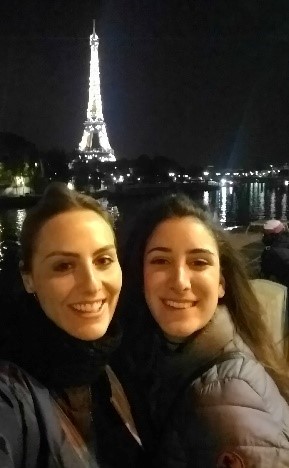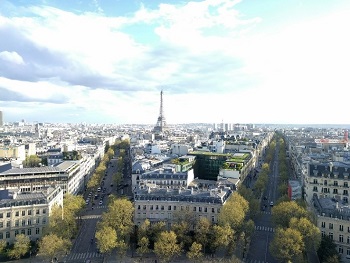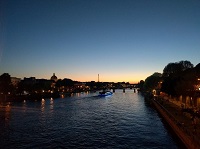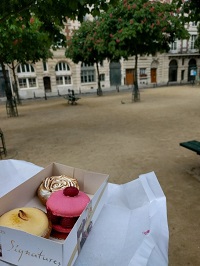
Angelika Starzer, Medical University of Vienna, Austria
by Angelika Starzer.
As a person who has always been fond of the idea of studying abroad and experiencing different educational systems I decided to apply for an Erasmus exchange during my 5th year at the medical school in Vienna, Austria. During grammar school I had learned French for several classes, so I wanted to brush up my language skills and applied for Paris, France. And it was with great joy that I accepted an offer from L’Université Paris Descartes.
Since I did not have a lot of opportunities to practice French in my first years of medical school I was well advised to take some French classes before my stay in Paris in order to meet the language skill requirements. At the Sprachenzentrum of the University of Vienna I found an excellent native French teacher and perfectly suitable classes.
Over the course of one semester, I completed a special Erasmus exchange language class with a language exam at level B2, which was the required language level of the university in Paris.
Luckily, my teacher offered a special medical French class the following semester which helped me a lot in feeling more comfortable using a foreign language in a medical context.
The administrative tasks for my home university as well as for Université Descartes were rather uncomplicated and straight forward since both universities are very well acquainted with the Erasmus exchange requirements. Therefore, the communication from both sides was very clear and helpful for me.
Overall, organizing this Erasmus exchange took me about 12 months, including the application, completing the language requirements (two semester) as well as sharing all administrative documents with the university in Paris. I could not wait for March 2017 to come around when it was finally time to pack my bags and say “Au revoir Autriche – Bonjour la France!”

(c) Angelika Starzer- View from Arc de triomphe, Paris April 2017
Working in Hôpital St. Joseph, 14. Arrondissement de Paris
I applied for a clinical rotation in Neurology as part of my 5th year of medical education. I was allocated to the Hospital St. Joseph in Paris by Université Descartes. French medical students spend their last three years (of a total of six years of medical studies) on 3-months-rotations in hospitals. Therfore, even though my home university only required a one-month rotation in this field, I had to complete a three-months rotation as well. Given that I am very interested in the field of Neurology, I saw this as a great opportunity to learn and see as much as possible in this field.
I was excited to find out that the hospital St. Joseph had a big neurology department consisting of 4 different specialty wards and 2 neurological critical care wards. The team per section consisted of two to three medical students, one intern, the attending and a group of nurses. Everyone was extremely engaged and the atmosphere in the team was very friendly.
We as medical students had very structured tasks and duties. We evenly divided the patients in our section amongst us. Every student had to pre-round their patients in the morning, examine them and write notes in the hospital computer system. We also had to check recent labs and results of any examination or imaging. During the grand rounds in the team we could make suggestions concerning further care of the patients. Twice a week interns or attendings held teaching sessions for the students. In addition to that, two times per week there were radiology conferences where brain images of the patients were discussed with the whole team of doctors. Students were also asked to shortly present their patients if they were undergoing imaging.

(c) Angelika Starzer – Paris at night next to the Seine, Paris May 2017
The working hours usually ranged from 9 am to 1 pm every day. On most afternoons international students were given the opportunity to visit lectures at the university. All the students also had to take part in 2 up to 3 night shifts at the critical care unit of the cardiological department as well as 2 to 3 weekend shifts per each 3-months-rotation. Contrary to other rotations I have experienced so far in Austria and Germany, all the students, including international students, were paid (around 200€ per month and extra payment per nightshift) by the hospitals.
In order to successfully complete the clinical rotation every student had to give a presentation about an interesting patient case at the end of the rotation.
All in all, I think the French medical students get taught to work very independently in clinics at an early stage of their education. Their last three years of studies are comparable with our last clinical year in Austria. One big difference is that medical students in France are not drawing blood, giving infusions or doing other practical clinical skills. These tasks are completely done by the nurses whereas in Austria they are a big part of our clinical internships.
As far as a liability insurance is concerned, I did not have to organize an additional one to the one I already obtain. In European countries the insurance is still covered by the home university (ÖH Med Wien).
One thing I like to call out is that I definitely had difficulties at the beginning of my rotation with my French language skills. I already assumed that the doctors would not have the time to translate a lot into English during the busy work day, so I really had to learn to keep up in French quickly. However, all the other medical students were always happy to help and translate or repeat for me more slowly. Over the three months I stayed in Paris, my French improved a lot as I used the language all day at the hospital. In addition to that I was very happy to make good friends with whom I spent my free time and talked as much in French as possible.
Hopefully these were some useful and interesting insights into my exchange semester in Paris. I truly fell in love with this amazingly beautiful and romantic city and enjoyed my work in the hospital very much. I can highly recommend every medical student to go there and check out the French medical system.
Feel free to contact me regarding any further questions. I am happy to help. You can e-mail office@goinginternational.org and I will get back to you as soon as possible.
Interesting websites and additional information
- Here you can find information about the hospital I worked at, Hospital St. Joseph in Paris

(c) Angelika Starzer – Paris’ bakeries are uncomparable throughout the world, June 2017
- When you go to Paris with the Erasmus exchange program you get the Erasmus scholarship. Your university should give you all the information about the necessary steps to do. There are some requirements to fulfill during your stay (online language assessments, final report) in order to get the scholarship.
- An excellent housing possibility is the Cité Internationale Universitaire de Paris, a student housing complex for Master degree students (as a medical student in your final two years you can apply as post-Bachelor study degree) in the 14. district of Paris. It is close to a lot of hospitals and not far from the city center either. There are houses in the style of different countries – for example a Greek house, a Spanish house, an Asian house and so on. You apply centrally at their website and they allocate you to a house with available rooms (please note, that might not necessarily be your country’s house). Also very nice is the Maison des Provinces de France. The prices are reasonable for Paris and differ according to the houses and types of rooms (single/double, with/without own bathroom and kitchen).
- Websites to find accommodation to sub rent: La carte des colocs, appartager.com
- French medical students are paid on a monthly basis for their rotations (around 200€ per month). Requirement is a French bank account. It was a little bit tricky to find a bank that would let me open a bank account for three months only as most banks require a six month stay minimum. I made an appointment at the bank and explained that I do not know the exact time of my stay yet and I might prolong my internship over the summer. This way I was able to open a bank account at Sociète Generale which also offers a youth package with good conditions for students.
- Also, as an international student you can apply for financial housing support at the CAF (Caisse d’Allocations familiales de Paris). You need to make an appointment online at their website and bring the demanded documents with you. Normally it takes a long time for them to transfer the financial support, but it is a very nice opportunity to make your stay in quite expensive Paris a little bit cheaper.
- For some of the bureaucratic processes (applying at the CAF for financial support, applying at the Cité universitaire, opening a bank account) you need to bring certain documents. It would be very handy to organize some of them already at home before you leave for Paris. For example, the CAF requires a birth certificate in different languages (French, English) that you normally can get at your town hall. It is also very useful to bring some recently taken passport photos. And for housing applications (Cité universitaire or sub rent) it is also good to bring a financial support letter signed by a parent or guardian that he/she financially supports you in order to pay the rent (you can find templates / documents in French online).
- A very helpful book for French medical terms written by a former medical studentis: Französisch für Mediziner – F. Balzer, Elsevier Verlag:. I can highly recommend to carry it in your pocket! You can find it on Amazon.
- For a mobile phone contract, I can recommend Free where you can get cheap monthly contracts immediately (big store close to La Madeleine, subway station)
- Paris offers an incredible number of museums and sights for your cultural experience! Luckily, most of the museums and monuments are free on admission when you are <26 years old. It is required to show a photo ID card or your passport. So you could go visit the Louvre every day!
Here you can download the experience report as PDF file.
If you are interested in working abroad as a medical student or doctor, click here for more information.
Published in GI-Mail 07/2018 (German edition) and GI-Mail 10/2018 (English edition). Sign up for GI-Mail here. 
Tip: More up to date educational events can be found online in the Education Database »medicine & health«.

2 Comments
I have been looking for this Medical Students article since long time. Thanks author.
My compliment about this blog is exceptionally positive I visit this blog the first time and inspire by this good stuff work. Incredible post keeps up posting such great information.
student accommodation